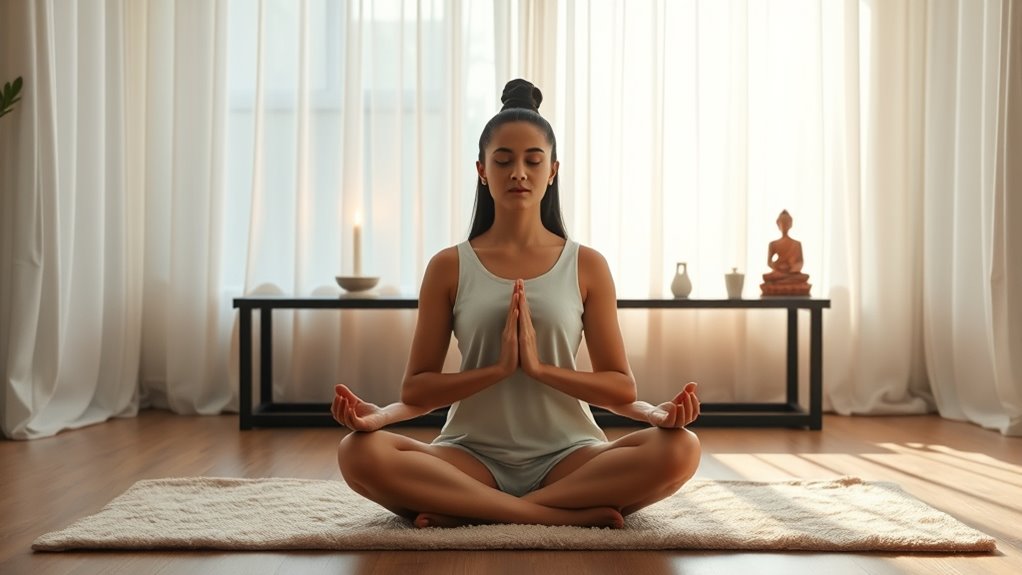Vipassana meditation is a mindfulness practice where you focus on observing your thoughts, feelings, and sensations with clear awareness, aiming to see things as they truly are. It encourages you to stay present, notice impermanence, and develop detached awareness without judgment or distraction. By regularly practicing, you’ll gain mental clarity, inner calm, and a better understanding of your mind and body. If you continue exploring, you’ll discover how this ancient technique can profoundly impact your life.
Key Takeaways
- Vipassana meditation is an ancient mindfulness practice focused on observing thoughts, feelings, and sensations with clear awareness.
- It emphasizes seeing experiences as they truly are, without judgment or attachment.
- The practice involves simple techniques like focusing on the breath and objectively observing bodily sensations.
- Regular practice cultivates mental clarity, inner calm, and insight into the impermanent nature of experiences.
- Suitable for all levels, Vipassana promotes self-awareness, compassion, and a deeper understanding of the mind and body.

Vipassana meditation is an ancient practice that encourages you to observe your thoughts, feelings, and sensations with clear awareness. It’s a form of mindfulness practice that helps you develop a deep understanding of your mind and body. Unlike some meditation techniques that focus on relaxing or emptying the mind, Vipassana emphasizes seeing things as they truly are, without judgment. You learn to notice your experiences in the present moment, which fosters greater clarity and equanimity.
When you begin practicing Vipassana, you might start with simple observation techniques. You sit quietly, close your eyes if you prefer, and pay close attention to your breath. This breath-focused meditation often serves as an anchor, grounding you in the present. As you become more comfortable, you start to notice sensations in your body—tingling, warmth, pressure, or discomfort. Instead of reacting to these sensations, you practice observing them objectively, acknowledging their presence without attachment or aversion. This is at the heart of Vipassana’s meditation techniques: cultivating a detached awareness that allows you to see impermanence and change in every experience.
Through consistent practice, you’ll notice that your mind naturally wanders, but the key is gently bringing your focus back to your breath or sensations. This process trains your attention, making it easier to stay present during daily life. As you deepen your practice, you’ll also start to observe your thoughts and emotions rise and fade away, gaining insight into patterns that influence your behavior. This heightened mindfulness can help you respond more skillfully to stress and challenges, rather than reacting impulsively.
The beauty of Vipassana is that it’s accessible to everyone, regardless of experience level. Its meditation techniques are simple but profound, emphasizing direct observation rather than complex rituals or beliefs. Over time, your practice can lead to a state of inner calm and increased clarity. Many practitioners find that Vipassana not only enhances their mental clarity but also fosters compassion for themselves and others. It’s a journey of self-awareness that unfolds naturally through consistent, mindful observation. Additionally, understanding the airless paint sprayers principles of maintenance and troubleshooting can serve as a metaphor for caring for your mental well-being, emphasizing regular check-ins and adjustments to maintain optimal function.
Frequently Asked Questions
How Long Does a Typical Vipassana Retreat Last?
A typical Vipassana retreat lasts about 10 days. During this retreat, you’ll follow a strict schedule overview with early morning meditation sessions, multiple breaks, and evening sittings. You spend most of your time practicing silent meditation, focusing on breath and bodily sensations. The retreat’s duration helps deepen your practice, allowing you to experience insights and mental clarity. Prepare for a disciplined but rewarding journey into self-awareness and inner peace.
Can Beginners Practice Vipassana Meditation Effectively?
Yes, beginners can practice Vipassana meditation effectively. The practice is designed to be beginner friendly and uses accessible techniques that help you develop awareness and mindfulness gradually. You don’t need prior experience, and the method’s simplicity makes it easy to incorporate into daily life. Start with short sessions, focus on your breath, and be patient; over time, you’ll deepen your understanding and experience the benefits.
What Are the Common Challenges Faced During Vipassana Practice?
Like a storm testing your ship, common challenges in Vipassana include wandering thoughts and emotional resistance. You might struggle with maintaining mindfulness consistency or face emotional resilience hurdles during silence. These obstacles are natural, but with patience, you grow stronger. Embrace each difficulty as part of the journey, knowing that persistent practice helps you develop deeper awareness and inner stability, turning challenges into stepping stones toward clarity and peace.
Is Vipassana Suitable for People With Mental Health Issues?
Vipassana meditation can be suitable for some with mental health issues, but it depends on your mental health compatibility and emotional resilience. If you’re experiencing severe mental health challenges, you should consult a healthcare professional before starting. The practice encourages mindfulness and self-awareness, which can help manage symptoms, but it may also bring up intense emotions. Proceed cautiously, listen to your body, and seek support when needed.
How Does Vipassana Differ From Other Meditation Techniques?
You’ll find that Vipassana’s mindfulness distinction lies in its focus on observing sensations and thoughts without attachment, fostering deep insight. Unlike other meditation techniques that may concentrate on relaxation or visualization, Vipassana emphasizes a clear, equanimous awareness of reality. In meditation comparison, it’s a rigorous practice that promotes inner truth, helping you understand the impermanence of experience and develop profound mental clarity.
Conclusion
Now that you know what Vipassana meditation is, it’s clear that this practice can truly open your eyes to your inner world. By regularly practicing, you’ll start to see things more clearly and stay grounded amid life’s chaos. Remember, you’re not just chasing a quick fix—you’re planting seeds for long-term peace. So, don’t wait for a perfect moment; sometimes, you’ve got to seize the day and dive right in.








